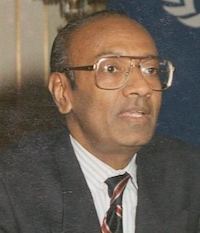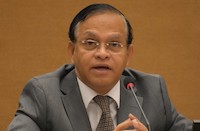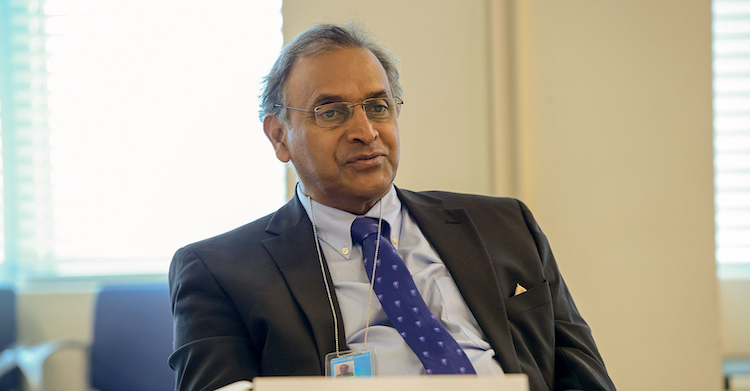UNITED NATIONS, 28 May 2023 (IDN) — The sad demise of Sri Lanka’s veteran diplomat Dr Jayantha Dhanapala at the Kandy National Hospital, was announced on 27 May. Following are tributes by Nandasiri (Nandi) Jasentuliyana, former Deputy Director-General of the United Nations and Director UN Office for Outer Space Affairs (UNOSA), and Ambassador A. L. A. Azeez, who last represented Sri Lanka in Geneva.
Nandasiri (Nandi) Jasentuliyana writes:
 < Photo credit: Alchetron
< Photo credit: Alchetron
I was saddened to learn that our friend and Sri Lanka’s prominent diplomat Ambassador Jayantha Dhanapala has quietly closed the door of life and departed from us. To me, a sorrow that is deep and personal.
I have known Jayantha since we were two of three finalists for the Herald Tribune essay contest for a traveling scholarship to the United States in the late 1950s; he from Trinity, and I from Richmond, and he won out.
Since then, he never stopped shining on the international stage, culminating in his narrow loss in the competition for the Secretary General of the United States post. In the meantime, he had served Sri Lanka as a foreign service member in countless capitals and as Ambassador to India, China, the United States and the United Nations, and Washington.
He also served as Under-Secretary-General of the United Nations Department of Disarmament, during which he led the U.N. team to investigate the nuclear sites in Iraq just before the Iraqi war and later headed the U.N. Institute of Disarmament Research (UNIDIR).
I had the privilege of working closely with him on joint U.N. projects and traveling to various cities, including Ulan Bator, Mongolia, during which we nearly escaped an airline disaster over the then-Soviet Union. Whether it was in the course of official work or the relaxed evenings we spent after a full day of work, it was highly congenial to be in his company.
At work, he knew the art of negotiation of being firm while being most congenial, no mean talent that took him to the summit of international diplomacy. He also served Sri Lanka as Foreign Secretary, Head of the Peace Secretariat, and finally as Senior Advisor to the President of Sri Lanka. Few Sri Lankans have ever reached those dizzy heights.
The loss of my friend profoundly saddens me, and I join the diplomatic world that will mourn the death of a diplomat par excellence and a Gentleman to the hilt who served Mother Lanka well! Adlai Stevenson, the U.S. Ambassador to the United Nations, once commented about a man and his contribution: “It is not the years in a life that counts; it is the life in the years.” By that measure, Jayantha Dhanapala is a shining star that lived! We will miss him, and may he find peace!
In a personal tribute, a former Sri Lankan Ambassador A. L. A. Azeez writes:

< Photo source: UNCTAD
The former United Nations Under-Secretary General Jayantha Dhanapala, one of my benevolent mentors in my formative years in the Foreign Service, breathed his last in Kandy today.
The Late Mr. Dhanapala joined Ceylon Overseas Service in 1966, and after several diplomatic assignments which included Sri Lanka’s Deputy High Commissioner in New Delhi, Ambassador and Permanent Representative in Geneva and Ambassador in Washington, he retired prematurely from Sri Lanka Foreign Service in the late 1990s.
He then went on to take up appointment as Under-Secretary General of the United Nations (1998 – 2003), an honour extended to him by the former Secretary General Kofi Annan. It was in recognition of his relentless diplomatic efforts, acumen, and contributions in the field of Disarmament and Non-Proliferation.
Only a year before his appointment, he had led the successful conclusion of the historic 1995 NPT Review and Extension Conference. The delicate package containing multiple steps that the State Parties to the Non-Proliferation Treaty committed themselves to implementing in return for the indefinite extension of the Treaty as well as the declaration on negotiating Middle East as a nuclear weapons-free zone, adopted by consensus under his chairmanship, still stands out as an important reference point for all NPT-related discourses to date.
It was in June 1992 that I came to know Ambassador Dhanapala, four months after joining the Sri Lanka Foreign Service (SLFS). Ambassador Dhanapala had returned to the Ministry of Foreign Affairs after an illustrious career as Director of the United Nations Institute for Disarmament Research (UNIDIR), preceded by an equally illustrious Ambassadorial assignment as Sri Lanka’s Permanent Representative to the UN in Geneva.
He was put in charge of the Economic Affairs Division as its Director General. Consistent with President Ranasinghe Premadasa’s vision of making the Foreign Ministry reflect the cultural diversity and heritage of the country in its outlook, Ambassador Dhanapala was tasked with leading a multi-disciplinary group of experts to come up with recommendations for the purpose. The committee had the best of professionals and experts from universities and state agencies representing varied fields such as archives, architecture, archaeology, interior design, history, international relations and diplomacy etc.
Interestingly, the United Nations Association of Sri Lanka had organised a seminar at Hotel Taj Samudra, around the same time as the committee was established. That was, inter alia, to discuss post-Cold War challenges faced by the UN and its role in the ’emerging new International order’. Ambassador Dhanapala was to be a discussant at the seminar. He had already circulated the invitation to all foreign service cadets. I was excited, and went there on time, and listened to all speeches.
It was then the time for Q&A.
The guest speaker was Prof. G L Peiris, who was then the Vice-Chancellor of the University of Colombo. He answered my question from his photographic memory of different articles of the UN Charter. But the field of international politics is different, the term “International rule of law” had then yet to come into vogue.
The very next day, I got a message from Ambassador Dhanapala asking me to see him in his office. I went in there promptly “Good Morning Sir, You have asked me to see you.” Nothing could be a more uplifting moment for me: “Young man, I saw you yesterday. It was a good question.”
Then he wanted to know where I was from and what my educational background was. What can I say? I am from the backwaters of Batticalao! Long years after this introduction, he recalled wherever we met, “Here comes the man from Kalmunai.”
He said he was putting a note to Foreign Secretary regarding the ‘heritage committee’ and he was suggesting my name as Secretary to the Committee.” Then he went on to explain what my task was: sending out invitations for meetings, taking minutes of discussions, coordinating with other line agencies, and attending to logistics.
“Most importantly”, he said “You have to go to national archives, trace and read records, take photo copies of relevant pages of maps, building plans, designs etc, and then go to library, look for the books recommended by committee members, read them, take copies of relevant chapters. You have to submit a detailed report to the committee, but I will clear it before submission.”
This was the first time that anyone outside the circle of my family and friends showed confidence in me. It made a world of difference for me in later years.
It was so encouraging to think of the tasks ahead as he outlined. Days and weeks saw me working closely with Ambassador Dhanapala. Draft reports submitted for his clearance came back to me promptly with minimum textual changes, reordering of paragraphs, and comments where there were questions or clarity needed.
In search of answers to questions he raised, it often fell to me to talk to the members of the committee, and they too were prompt in providing information, clarification, or guidance. It brought me particularly close to veteran diplomat Dr. Vernon Mendis, easily Sri Lanka’s only Diplomatic Historian I knew of.
That helped develop to some extent my communication skills.
Nevertheless, not all things were rosy on the foreign service front. As in the case of many hardworking young foreign service officers then (as even now, I guess), as breeze began to blow in from one direction, hailstorm followed from another. Obstacles were thrown in by immediate seniors in division to which I was attached, with a sudden surge of work thrust on me after having neglected me for months. Disappointing though, I was unnerved.
Ambassador Dhanapala saw all this through. He invited junior colleagues to all talks or discussions he organised with other intellectuals and scholars. Opportunities were given to juniors to raise questions and make comments.
That was the intellectual milieu in which the Ministry worked in the 1990s and it thrived under Late Lakshman Kadirgamar and was not restored since.
By September 1992 when it was confirmed that I would proceed on a Swiss scholarship to follow a one-year study programme on multilateral diplomacy at the Graduate Institute of International Studies of the University of Geneva, Ambassador Dhanapala was so pleased. At the last meeting of the committee that coordinated a fortnight before my departure to Geneva, Ambassador Dhanapala highlighted the contributions I made to the Committee’s work, which led to other members also expressing appreciation for it. He asked me to submit the draft report of the meeting before I left for Geneva.
When I sent the draft report later for his clearance, I ensured it only contained substantive matters the committee discussed. With minor textual changes, the draft was returned to me for finalisation. As I turned over the pages, I was struck by what he had written in his hand as a new last paragraph. It said something glowingly about me and the work I did for the committee.
It didn’t stop there. A couple of days before I departed Colombo, Ambassador Dhanapala extended a nicely printed invitation to me for lunch at his Nugegoda home. Over a sumptuous lunch, he, his beloved wife and daughter Kiran chatted with me and shared tidbits about life in Geneva. They were such an endearing, gracious and hospitable family (his son Sivanka—I met him in Vienna when I went there to attend a UN meeting in 1994).
This relationship of special trust that was established with Ambassador Dhanapala did not end after I left Sri Lanka. In fact, it flourished only after I arrived in Geneva. In Switzerland, I was going to be a student, left to my own devices, living on a monthly stipend generously provided by the Swiss Government. But surprises awaited me at every turn of my new ‘foreign’ life.
When I went to the institute for the first time, there was a message that two professors wanted me to contact them. A few UN officials had called the Sri Lanka Mission in Geneva to let me know that they were trying to contact me. Additionally, a few Sri Lankans got my hostel telephone number and called directly to ask after me.
Everyone whom I met following these messages and telephone calls told me invariably one thing. That was, they had received letters by post from Ambassador Dhanapala in Colombo introducing ‘me’ to them and asking them to ‘look after’ me personally. Not a week passed hence without my being hosted to coffee, lunch or dinner by each of them.
I myself received a letter from Ambassador Dhanapala a few months into my study programme. It informed me that I would be attached to the Sri Lanka Mission in Geneva after completion of my studies.
And that’s how I ended up doing multilateral diplomacy—a journey that took me to Kathmandu, New York, Vienna and back to Geneva, with a bilateral diplomatic assignment in Canberra in the early 2000s. When the Government of Sri Lanka decided in 2004 that Ambassador Dhanapala’s candidature should be presented for the UN Secretary General’s post, I was included as part of the campaign team to lobby support for it. He and I went on an official mission to Argentina and Peru, two non-permanent members of the UN Security Council, to meet high officials with regard to his candidature. Years later, when he visited Vienna in 2013, he spent some quality time with me traversing memory lanes and recalling the best moments in his most distinguished foreign service career.
My last meeting with him was in August 2020 at his Nugegoda residence. It was a get-together of all four of us—his beloved wife Maureen, daughter Kiran, Ambassador Dhanapala and myself. Our discussion turned to the governing culture of the country. He used a word to describe it and told me he was only calling a spade a spade. He said he was worried about minorities referring to anti-minority rhetorics that was then rampant, and particularly to the issue of forced cremation.
There is so much to say about this iconic diplomat on all this. However, emotions clog my mind as I reflect on it and recall instances where he stood for principles and for fellowship.
Beloved Sir, May your good soul rest in peace!
*Jayantha Dhanapala was a longstanding Sri Lankan diplomat who served in London, Beijing, Washington D.C., and New Delhi before being appointed ambassador and permanent representative of Sri Lanka to the UN in Geneva (1984-87) and ambassador of Sri Lanka to the USA (1995-97). As an international civil servant, he was director of the UN Institute for Disarmament Research (1987-92) and under-secretary-general for Disarmament Affairs (1998-2003). Dhanapala is widely acclaimed for his presidency of the 1995 Nuclear Non-Proliferation Treaty Review and Extension Conference. [IDN-InDepthNews]
Photo: The late Dr Jayantha Dhanapala. Source: Trinity College, Kandy, Sri Lanka.
IDN is the flagship agency of the Non-profit International Press Syndicate.
Visit us on Facebook and Twitter.
We believe in the free flow of information. Republish our articles for free, online or in print, under Creative Commons Attribution 4.0 International, except for articles that are republished with permission.

